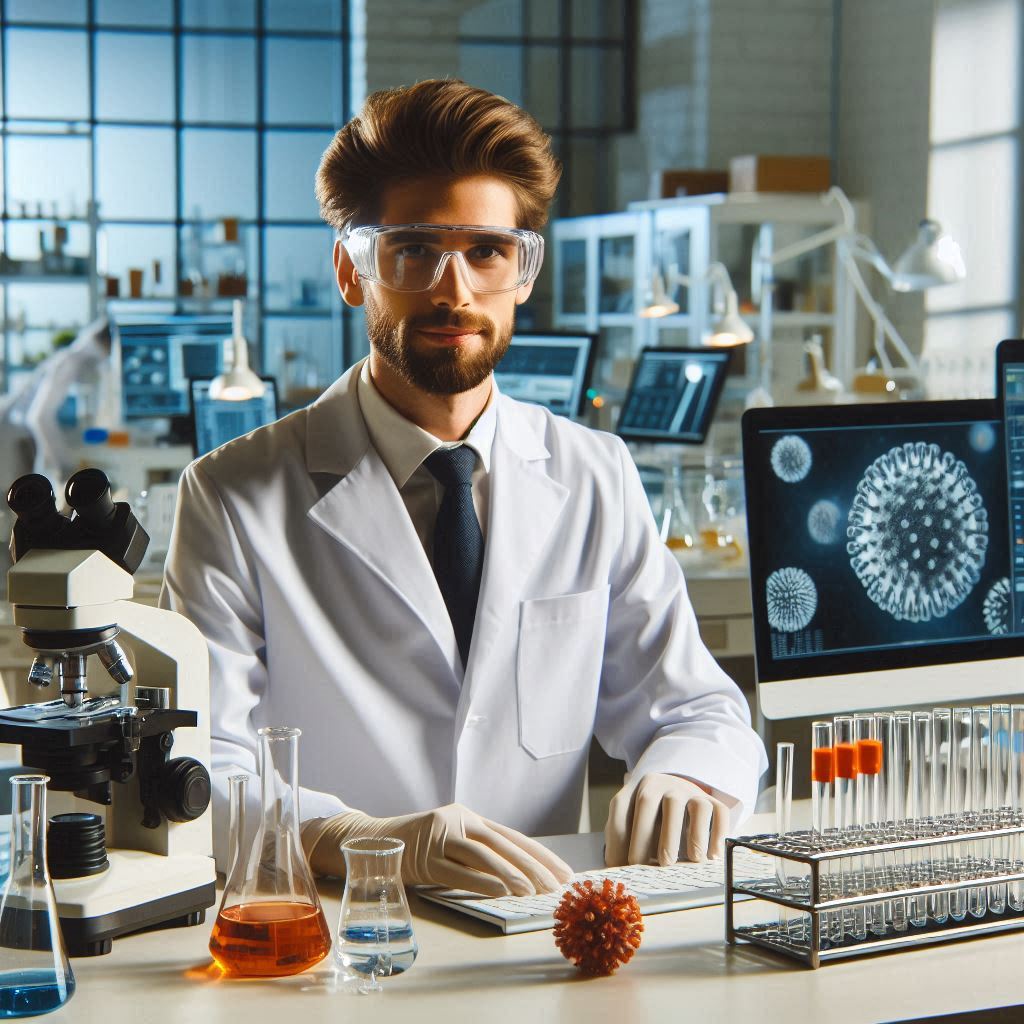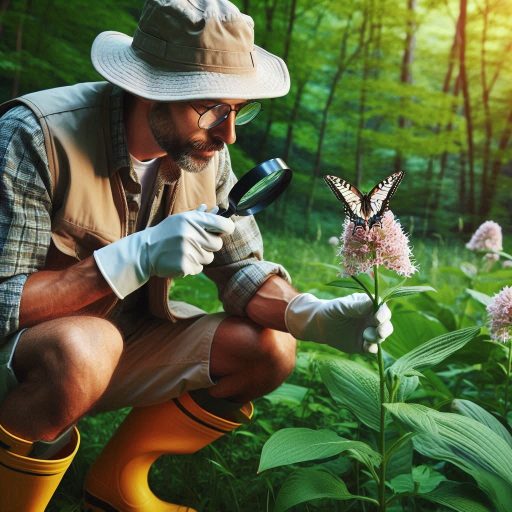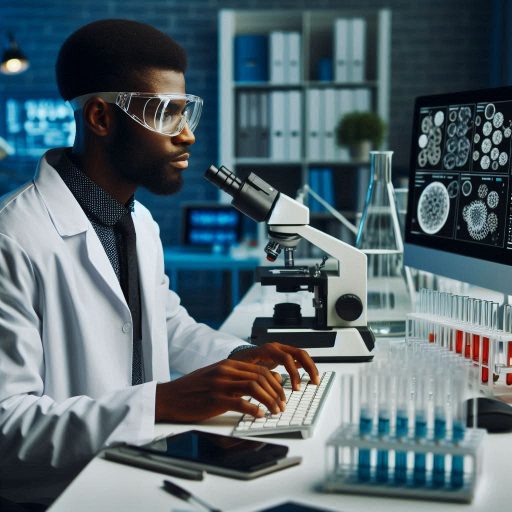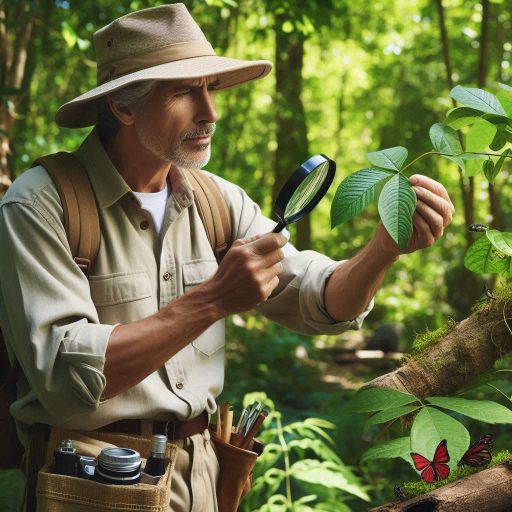Introduction
Understanding the difference between a virologist and a microbiologist is essential for aspiring scientists.
Both professions focus on studying microorganisms, but their areas of expertise differ significantly.
Virologists specialize in viruses, exploring their structure, function, and impact on living organisms.
They work primarily with viral pathogens and study their interactions with hosts.
Microbiologists, on the other hand, study a broader range of microorganisms, including bacteria, fungi, and protozoa.
They investigate the biology, ecology, and genetics of these organisms, often exploring their roles in various environments.
Recognizing the distinctions between these two fields helps students choose the right educational path.
Understanding these differences is vital for individuals interested in pursuing careers in infectious disease research or public health.
This blog post will explore the key differences between virologists and microbiologists.
We will discuss their specific roles, the skills required for each profession, and the various career opportunities available.
By examining these aspects, we aim to clarify how each profession contributes to our understanding of health and disease.
Ultimately, this information will guide aspiring scientists in making informed decisions about their future careers.
Definition of Virologist
The Role of a Virologist
A virologist specializes in studying viruses and their effects on living organisms.
They conduct research to understand how viruses replicate, mutate, and spread.
Virologists work in laboratories, using advanced techniques to analyze viral behavior.
Their research often involves isolating viruses from various sources, including human, animal, and environmental samples.
Virologists also collaborate with other scientists to develop treatments and vaccines.
They study the interactions between viruses and host cells.
This knowledge is critical for designing effective antiviral drugs and preventive measures.
Virologists play a key role in understanding the life cycle of viruses.
The Focus of Virology on Studying Viruses
Virology focuses specifically on viruses, which are unique infectious agents.
Unlike bacteria, viruses cannot reproduce independently; they need host cells.
This dependence makes studying viruses complex and fascinating.
Virologists investigate various aspects of viral life, including entry, replication, and transmission.
In their research, virologists classify viruses based on their structure and genetic material.
They study different families of viruses, such as RNA and DNA viruses.
Understanding these classifications helps researchers develop targeted treatments and vaccines.
Virology also encompasses emerging viruses, such as coronaviruses and influenza.
Virologists closely monitor these viruses for changes that may impact public health.
Their expertise is essential for identifying new viral threats and developing response strategies.
The Significance of Virologists in Public Health
Virologists play a crucial role in public health by monitoring and controlling viral outbreaks.
Their research helps identify the source and transmission routes of viruses.
This information is vital for implementing effective prevention strategies.
During viral outbreaks, virologists collaborate with public health officials.
They provide guidance on testing, vaccination, and treatment options.
Their expertise informs policy decisions that protect community health.
Moreover, virologists contribute to vaccine development and testing.
They ensure that vaccines are safe and effective before public distribution.
This process involves extensive research and clinical trials.
In addition to infectious diseases, virologists study viruses that affect agriculture and livestock.
Understanding these viruses helps prevent economic losses in the agricultural sector.
Virologists work to safeguard food supplies and protect livestock health.
Virologists have a specialized role focused on studying viruses and their impact on health.
Their research contributes significantly to our understanding of viral behavior and transmission.
Virologists are essential in public health, helping to control viral outbreaks and develop effective vaccines.
By studying viruses, they play a critical role in protecting both human health and the agricultural sector.
The work of virologists is vital in addressing current and future viral challenges.
Definition of Microbiologist
Role of a Microbiologist
A microbiologist studies microorganisms, including bacteria, viruses, fungi, and protozoa.
They play a crucial role in understanding how these tiny organisms affect our world.
Microbiologists work in diverse settings, such as laboratories, hospitals, and research institutions.
Their primary responsibility involves conducting experiments and analyzing microbial behavior.
They often investigate how microorganisms interact with their environment and other living organisms.
Microbiologists contribute significantly to fields like medicine, agriculture, and environmental science.
In medicine, microbiologists study pathogens that cause diseases in humans.
They develop methods to diagnose infections and find effective treatments.
In agriculture, they explore the role of beneficial microbes in soil health and crop production.
Focus of Microbiology on Studying Microorganisms
Microbiology focuses on understanding microorganisms and their impact on various ecosystems.
It examines their structure, function, and genetics, providing insight into their biology.
Microbiologists study how microorganisms contribute to processes such as fermentation and decomposition.
This field encompasses both beneficial and harmful microorganisms.
Microbiologists seek to understand how pathogens cause diseases and develop strategies to combat infections.
They also explore the positive roles of microbes, such as those involved in nutrient cycling and bioremediation.
Moreover, microbiologists investigate the relationship between microorganisms and humans.
They research the human microbiome, which consists of trillions of microbes living in our bodies.
Understanding this relationship can lead to breakthroughs in health and disease prevention.
Various Subfields within Microbiology
Microbiology comprises several subfields, each focusing on specific aspects of microorganisms.
Some of the major subfields include bacteriology, virology, mycology, and parasitology.
Bacteriology focuses on the study of bacteria.
Bacteriologists investigate bacterial structure, function, and their role in health and disease.
They explore antibiotic resistance and develop new treatments for bacterial infections.
Virology deals specifically with viruses, studying their structure, replication, and interactions with host cells.
Virologists research viral diseases, their transmission, and potential vaccines.
This subfield has gained prominence due to recent global pandemics.
Mycology focuses on fungi, exploring their biology and importance in ecosystems.
Mycologists study pathogenic fungi that affect plants and animals.
They also research beneficial fungi used in food production and medicine, such as penicillin.
Parasitology examines parasites and their interactions with hosts.
Parasitologists study diseases caused by parasites, such as malaria and giardiasis.
They explore the life cycles of parasites and develop control measures.
In addition to these subfields, microbiology also includes immunology and environmental microbiology.
Immunology studies the immune response to microorganisms, while environmental microbiology investigates microbial communities in various ecosystems.
Therefore, microbiologists play a vital role in understanding microorganisms and their impact on health and the environment.
They study various microorganisms, focusing on their structure, function, and interactions.
With diverse subfields, microbiology provides a comprehensive view of the microscopic world, contributing significantly to science and medicine.
Understanding the role of microbiologists highlights the distinction between their work and that of virologists, who specifically focus on viruses.
Read: The Future of Botany: Emerging Fields and Innovations
Educational Requirements for Virologists
Academic Background Needed to Become a Virologist
To become a virologist, individuals must complete a relevant academic background.
Most virologists start with a bachelor‘s degree in biology, microbiology, or a related field.
This foundational education provides essential knowledge about biological sciences and cellular processes.
After earning a bachelor‘s degree, aspiring virologists typically pursue a master‘s or Ph.D. in virology or microbiology.
Graduate programs focus on advanced topics such as virology, molecular biology, and immunology.
Coursework often includes classes on viral pathogenesis, epidemiology, and diagnostic methods.
During their academic journey, students gain practical experience through laboratory work.
Hands-on training in laboratory techniques is crucial for understanding viral behavior.
Students also learn how to conduct research, analyze data, and interpret findings.
Specialized Training in Virology
In addition to formal education, specialized training is essential for a successful career as a virologist.
Many programs offer research opportunities that allow students to focus on specific viral pathogens.
This specialized training enhances their expertise in areas such as viral genetics, vaccine development, and antiviral therapies.
Internships or fellowships provide valuable real-world experience.
These opportunities allow students to work alongside experienced virologists in research settings.
Gaining experience in laboratories helps them understand the intricacies of virology research and public health implications.
Moreover, ongoing professional development is vital in this rapidly evolving field.
Virologists must stay updated on the latest research findings, technologies, and methodologies.
Attending conferences, workshops, and seminars is a common practice among professionals in the field.
Certifications and Licenses Required for Virologists
While certifications are not always mandatory, obtaining them can enhance a virologist‘s credentials.
Organizations like the American Society for Microbiology (ASM) offer certifications for microbiologists, which can include virology.
These certifications demonstrate a commitment to professional standards and ongoing education.
Virologists may also seek specialized training in biosafety and bioethics.
Understanding biohazard protocols is crucial for laboratory safety when handling viral samples.
Certifications in biosafety can help ensure compliance with safety regulations in research settings.
Licensing requirements for virologists can vary by state and work setting.
Some positions, particularly those involving clinical laboratory work, may require specific licenses.
It is essential for virologists to research the requirements in their area and comply with local regulations.
Becoming a virologist requires a solid academic background and specialized training.
Aspiring professionals must complete a relevant bachelor‘s degree followed by a master‘s or Ph.D.
Programs often provide hands-on experience and research opportunities.
While certifications and licenses are not always mandatory, they can enhance career prospects.
By pursuing a comprehensive education and ongoing training, aspiring virologists can build successful careers in this dynamic field.
Their work plays a vital role in advancing our understanding of viruses and improving public health outcomes.
Read: What Does a Geologist Do? Career Overview and Insights
Educational Requirements for Microbiologists
Academic Background Needed to Become a Microbiologist
To become a microbiologist, individuals typically start with a bachelor‘s degree in microbiology or a related field.
During their undergraduate studies, students take courses in biology, chemistry, and microbiology.
They gain foundational knowledge about microorganisms and their roles in various ecosystems.
Many microbiologists choose to pursue a master‘s degree or Ph.D. for advanced positions.
Graduate programs allow for specialization in areas such as bacteriology, virology, or mycology.
Students engage in in-depth research projects, enhancing their practical and theoretical understanding.
Courses in graduate programs often include advanced microbiology, immunology, and molecular biology.
These subjects prepare students for complex topics in the field.
Additionally, students learn laboratory techniques essential for microbiological research.
Specialized Training in Microbiology
Specialized training is crucial for aspiring microbiologists.
Many degree programs incorporate hands-on laboratory experience.
This training enables students to apply theoretical concepts in real-world settings.
Internships and research assistantships provide valuable practical experience.
Working in laboratories helps students develop essential skills in microbial techniques.
These experiences also help students build professional networks in the field.
During specialized training, students learn about various laboratory methods.
These methods include culturing microorganisms, performing biochemical tests, and analyzing microbial genetics.
Mastering these techniques is essential for conducting independent research.
Furthermore, students may attend workshops and seminars to enhance their knowledge.
These events expose them to the latest advancements and techniques in microbiology.
Networking opportunities at these events can lead to collaborations and job offers.
Certifications and Licenses Required for Microbiologists
While a specific license is not typically required to work as a microbiologist, certifications can enhance career prospects.
Professional organizations, such as the American Society for Microbiology (ASM), offer certification programs.
Certification through organizations like ASM demonstrates a microbiologist‘s competency and commitment to the profession.
It can also improve job prospects and opportunities for advancement.
Some employers may prefer or require certification for specific roles.
Additionally, laboratory safety certifications can be beneficial.
These certifications ensure microbiologists understand proper safety protocols and practices.
Knowledge of biosafety is crucial when working with pathogenic microorganisms.
Microbiologists may also benefit from continuing education courses.
These courses help them stay updated on industry trends and advancements.
Many organizations require continuing education to maintain certifications, ensuring professionals remain knowledgeable.
In review, becoming a microbiologist requires a solid academic background, specialized training, and potential certifications.
Aspiring microbiologists typically start with a relevant bachelor‘s degree and may pursue advanced degrees.
Hands-on training through internships and laboratory experiences is essential for developing practical skills.
While specific licenses are not necessary, obtaining certifications can enhance career prospects and demonstrate expertise.
With the right education and training, individuals can embark on rewarding careers in microbiology, contributing to science and public health.
Read: Educational Path: Becoming a Geologist in the USA
Job Responsibilities of Virologists
Typical Duties of a Virologist
Virologists primarily focus on studying viruses and their effects on living organisms.
They conduct laboratory experiments to understand viral behavior and pathology.
A typical day may involve isolating viruses from samples and analyzing their genetic makeup.
Virologists also develop methods for viral detection and identification.
This includes performing polymerase chain reaction (PCR) tests and serological assays.
They ensure that all laboratory procedures adhere to strict safety protocols.
In addition to laboratory work, virologists often collaborate with healthcare professionals.
They provide expertise on viral infections and help interpret diagnostic results.
This collaboration is essential for accurate disease management and patient care.
Virologists frequently engage in data analysis and interpretation.
They assess the implications of their findings for public health and clinical practices.
Documenting and presenting research results is also a crucial aspect of their duties.
Role of Virologists in Disease Prevention and Control
Virologists play a vital role in disease prevention and control.
They investigate viral outbreaks and identify potential sources of infection.
This information helps public health officials implement effective containment measures.
Through their research, virologists contribute to vaccine development and testing.
They study viral characteristics to design safe and effective vaccines.
Their work is crucial in mitigating the spread of infectious diseases.
Virologists also educate healthcare providers and the public about viral infections.
They share information on prevention strategies, such as vaccination and hygiene practices.
This outreach helps raise awareness and encourages proactive health measures.
In times of outbreaks, virologists often work on rapid response teams.
They assist in tracking virus transmission and monitoring cases.
Their expertise is essential for guiding public health responses and policy decisions.
The Research Aspect of Virology
Research is a core component of a virologist‘s career.
They explore fundamental questions about viral replication, transmission, and pathogenesis.
This research contributes to the broader understanding of infectious diseases.
Virologists often publish their findings in scientific journals.
This dissemination of knowledge advances the field and informs other researchers.
Collaborations with other scientists can lead to interdisciplinary studies and innovations.
In recent years, virologists have focused on emerging viruses.
They study zoonotic viruses that jump from animals to humans.
This research helps predict and prevent future outbreaks.
Moreover, virologists utilize advanced technologies in their research.
Techniques like CRISPR and next-generation sequencing revolutionize how they study viruses.
These tools allow for more in-depth analysis and understanding of viral mechanisms.
In short, virologists have distinct duties that set them apart from microbiologists.
Their focus on viruses allows them to contribute significantly to disease prevention and control.
Through rigorous research, virologists enhance our understanding of viral infections and their implications.
Their work is vital in developing effective strategies to combat infectious diseases and protect public health.
Read: Botany Career Fairs and Networking Events
Transform Your Career Today
Unlock a personalized career strategy that drives real results. Get tailored advice and a roadmap designed just for you.
Start Now
Job Responsibilities of Microbiologists
Typical Duties of a Microbiologist
Microbiologists perform various duties centered around studying microorganisms.
They conduct experiments to understand the behavior of bacteria, viruses, fungi, and protozoa.
These scientists analyze how microorganisms interact with their environments and other living organisms.
They often isolate and identify microorganisms using advanced laboratory techniques.
Microbiologists also monitor the growth and development of microbial cultures.
They assess the effects of different conditions on microbial life.
This work helps understand how to control or enhance microbial growth in various settings.
Additionally, microbiologists prepare detailed reports documenting their findings and methodologies.
Another important duty involves quality control.
Microbiologists test products for microbial contamination in pharmaceutical, food, and healthcare industries.
They ensure that products meet safety standards before reaching consumers.
Moreover, microbiologists often collaborate with other scientists and professionals in interdisciplinary teams.
The Role of Microbiologists in Various Industries
Microbiologists play essential roles in multiple industries.
In the healthcare sector, they work on disease prevention and control.
They analyze pathogens to develop diagnostic tests and treatments.
Their work is vital in combating infectious diseases and ensuring public health safety.
In the food industry, microbiologists help maintain food safety.
They study spoilage organisms and pathogens that can contaminate food products.
By developing preservation methods and quality assurance protocols, they ensure food products are safe for consumption.
Pharmaceutical companies rely on microbiologists for drug development.
These scientists study microbial processes to identify potential drug targets.
They also evaluate the effectiveness of antibiotics and other medications against specific pathogens.
Biotechnology companies utilize microbiologists in various research and development projects.
Microbiologists engineer microorganisms to produce valuable products, such as enzymes, hormones, and biofuels.
Their expertise in microbial genetics and metabolic pathways drives innovation in biotechnology.
Research Aspects of Microbiology
Research is a fundamental aspect of microbiology.
Microbiologists conduct basic and applied research to expand our understanding of microorganisms.
They explore microbial diversity, ecology, and evolution to uncover new insights.
In laboratory settings, microbiologists design experiments to test hypotheses.
They analyze data using statistical methods to draw meaningful conclusions.
This research often leads to the development of new technologies and techniques.
Collaboration is common among microbiologists in research endeavors.
They frequently work with ecologists, chemists, and molecular biologists to tackle complex questions.
Interdisciplinary approaches often yield innovative solutions to pressing global challenges, such as antibiotic resistance and disease outbreaks.
Microbiologists also publish their research in scientific journals.
Sharing findings with the scientific community fosters knowledge exchange and promotes further investigation.
Their contributions to the field are essential for advancing science and improving public health.
In essence, microbiologists have diverse and impactful duties across various industries.
They play vital roles in healthcare, food safety, pharmaceuticals, and biotechnology.
Their research efforts expand our understanding of microorganisms and drive innovation.
By exploring the differences between virologists and microbiologists, we appreciate the unique contributions each profession makes to science and society.
Both fields are essential for advancing our knowledge and addressing global health challenges.
Career Opportunities for Virologists
Potential Career Paths Available for Virologists
Virologists have diverse career paths available in various sectors.
Many work in academic research, focusing on viral diseases and their mechanisms.
These roles often involve teaching, mentoring students, and securing research funding.
Virologists can also find opportunities in government agencies, such as the Centers for Disease Control and Prevention (CDC).
Here, they contribute to public health initiatives and disease prevention strategies.
They might conduct research on viral outbreaks or develop vaccination programs.
Pharmaceutical companies also hire virologists to develop antiviral drugs and vaccines.
These professionals work on drug discovery, clinical trials, and regulatory compliance.
Their expertise is vital in bringing safe and effective treatments to market.
Additionally, virologists can pursue careers in biotechnology firms.
In these roles, they may develop innovative technologies for diagnosing and treating viral infections.
Some virologists choose to work in public health, analyzing data to inform policy decisions.
They assess viral disease prevalence and advocate for effective public health strategies.
This role often involves collaboration with various stakeholders, including healthcare providers and community organizations.
Job Prospects and Salary Expectations for Virologists
The job prospects for virologists remain strong due to the increasing demand for viral research.
The COVID-19 pandemic highlighted the importance of understanding viruses.
As a result, funding for virology research has increased significantly.
Virologists can expect competitive salaries, reflecting their specialized skills and expertise.
According to the U.S. Bureau of Labor Statistics, the median annual salary for microbiologists, which includes virologists, is approximately $81,650.
Entry-level virologists typically earn lower salaries, but experienced professionals can command higher wages.
Those in leadership positions or specialized roles may earn over $100,000 annually.
The demand for virologists is expected to grow, driven by ongoing research in infectious diseases and public health.
Virologists‘ expertise will be crucial in addressing future viral outbreaks and emerging threats.
Advancements and Trends in the Field of Virology
Recent advancements in virology significantly impact the field and open new avenues for research.
Technologies such as CRISPR and next-generation sequencing have revolutionized viral research.
These tools enable virologists to analyze viral genomes more efficiently and accurately.
There is also a growing focus on studying viral interactions with the host immune system.
Understanding these interactions can lead to improved vaccines and antiviral therapies.
This area of research is gaining attention as virologists seek to develop more effective treatments.
Furthermore, interdisciplinary collaborations are becoming increasingly common.
Virologists are working alongside immunologists, geneticists, and public health experts.
This collaboration enhances the overall understanding of viral diseases and fosters innovative solutions.
Another trend is the emphasis on global health and the prevention of pandemics.
Virologists are increasingly involved in international collaborations to monitor and respond to emerging viral threats.
These efforts are crucial in mitigating the impact of future outbreaks.
Virologists have diverse career paths in academia, government, pharmaceuticals, and public health.
Strong job prospects and competitive salaries make this field attractive.
Advancements in technology and research methods are shaping the future of virology.
As the demand for viral research continues to grow, virologists play a vital role in public health and disease prevention.
Their expertise will be crucial in addressing ongoing and emerging viral challenges.
Explore Further: Global Warming: How Climatologists Study Trends
Career Opportunities for Microbiologists
Potential Career Paths Available for Microbiologists
Microbiologists have a wide range of career paths available to them.
They can work in various sectors, including healthcare, research, and industry.
Many microbiologists find positions in hospitals, where they diagnose and monitor infections.
These roles often involve working with clinical samples and conducting tests.
Research microbiologists typically work in academic or government laboratories.
They study microorganisms to understand their biology and behavior.
These scientists may focus on bacteria, fungi, viruses, or parasites.
Their research often leads to advancements in medicine, agriculture, and environmental science.
Another career path involves working in biotechnology or pharmaceutical companies.
Microbiologists in these sectors develop new drugs, vaccines, and diagnostic tests.
They may also work on improving fermentation processes for food production or biofuel development.
Environmental microbiologists focus on microorganisms in natural ecosystems.
They study how these organisms affect soil health, water quality, and biogeochemical cycles.
Their work is crucial for addressing environmental issues like pollution and climate change.
Job Prospects and Salary Expectations for Microbiologists
The job prospects for microbiologists remain strong as the demand for skilled professionals increases.
The Bureau of Labor Statistics (BLS) projects employment growth for microbiologists over the next decade.
Factors contributing to this growth include advancements in biotechnology and increasing public health concerns.
Salaries for microbiologists can vary based on factors such as education and experience.
According to the BLS, the median annual salary for microbiologists is around $79,000.
Those working in research and development often earn higher salaries due to their specialized skills.
Microbiologists with advanced degrees, such as a master’s or Ph.D., typically command higher salaries.
Positions in management or senior research roles also offer increased earning potential.
Additionally, microbiologists who work in the pharmaceutical industry often receive competitive compensation packages.
Advancements and Trends in the Field of Microbiology
Microbiology is an ever-evolving field with exciting advancements and trends.
The rise of molecular techniques has revolutionized microbial research.
Techniques such as next-generation sequencing allow microbiologists to study genomes rapidly and comprehensively.
Another trend is the increasing focus on microbial communities, known as microbiomes.
Research on human, animal, and environmental microbiomes is gaining traction.
Understanding these complex ecosystems helps scientists uncover their roles in health and disease.
Antibiotic resistance remains a critical challenge in microbiology.
Researchers are actively investigating new strategies to combat resistant pathogens.
This area of study is crucial for developing effective treatments and preserving public health.
Finally, interdisciplinary collaboration is becoming more common in microbiology.
Microbiologists often work alongside bioinformaticians, chemists, and engineers.
This collaboration fosters innovation and leads to groundbreaking discoveries in the field.
All in all, microbiologists enjoy diverse career paths in various sectors.
Job prospects remain strong, with competitive salaries reflecting their expertise.
Advancements in technology and research continue to shape the field of microbiology.
As microbiologists tackle emerging challenges, their contributions remain essential for public health and scientific progress.
Conclusion
Virologists and microbiologists play crucial roles in the field of science, but their focuses differ significantly.
Virologists specialize in studying viruses, including their structure, replication, and effects on host organisms.
They investigate viral diseases and develop vaccines and treatments to combat them.
In contrast, microbiologists study a broader range of microorganisms, including bacteria, fungi, and protozoa.
They explore how these organisms interact with their environments and impact human health.
Microbiologists also research beneficial microbes used in agriculture and biotechnology.
Both professions contribute uniquely to science.
Virologists help address viral outbreaks and advance our understanding of infectious diseases.
Their work is vital for public health initiatives and vaccine development.
Microbiologists contribute to advancements in various industries, including healthcare, agriculture, and environmental science.
Aspiring scientists should consider both career paths.
Each field offers diverse opportunities for research and impact.
Exploring virology and microbiology can lead to exciting and fulfilling careers in science.
Students should seek internships, workshops, and educational programs to gain experience.
By doing so, they can better understand which path aligns with their interests and goals in the scientific community.
[E-Books for Sale]
The Big Book of 500 High-Paying Jobs in America: Unlock Your Earning Potential
$19.99 • 500 High-Paying Jobs • 330 pages
Explore 500 high-paying jobs in America and learn how to boost your career, earn more, and achieve success!
See All 500 High-Paying Jobs of this E-Book
1001 Professions Without a Degree: High-Paying American Jobs You Can Start Now
$19.99 • 1001 Professions Without a Degree • 174 pages
Discover 1001 high-paying jobs without a degree! Unlock career tips, skills, and success strategies for just $19.99!




